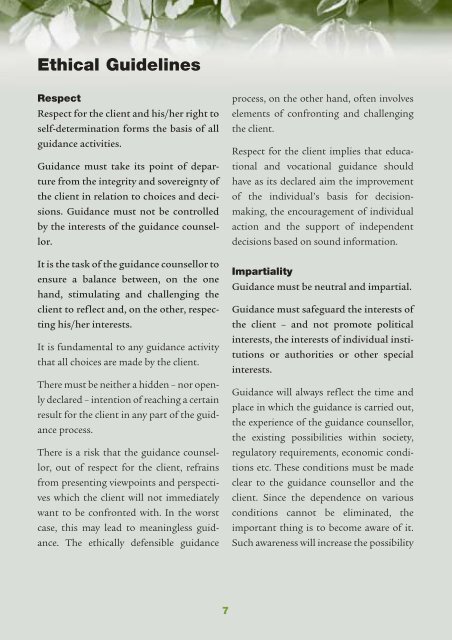Ethics in Guidance Ethics in Guidance
Ethics in Guidance Ethics in Guidance
Ethics in Guidance Ethics in Guidance
Create successful ePaper yourself
Turn your PDF publications into a flip-book with our unique Google optimized e-Paper software.
Ethical Guidel<strong>in</strong>es<br />
Respect<br />
Respect for the client and his/her right to<br />
self-determ<strong>in</strong>ation forms the basis of all<br />
guidance activities.<br />
<strong>Guidance</strong> must take its po<strong>in</strong>t of departure<br />
from the <strong>in</strong>tegrity and sovereignty of<br />
the client <strong>in</strong> relation to choices and decisions.<br />
<strong>Guidance</strong> must not be controlled<br />
by the <strong>in</strong>terests of the guidance counsellor.<br />
It is the task of the guidance counsellor to<br />
ensure a balance between, on the one<br />
hand, stimulat<strong>in</strong>g and challeng<strong>in</strong>g the<br />
client to reflect and, on the other, respect<strong>in</strong>g<br />
his/her <strong>in</strong>terests.<br />
It is fundamental to any guidance activity<br />
that all choices are made by the client.<br />
There must be neither a hidden – nor openly<br />
declared – <strong>in</strong>tention of reach<strong>in</strong>g a certa<strong>in</strong><br />
result for the client <strong>in</strong> any part of the guidance<br />
process.<br />
There is a risk that the guidance counsellor,<br />
out of respect for the client, refra<strong>in</strong>s<br />
from present<strong>in</strong>g viewpo<strong>in</strong>ts and perspectives<br />
which the client will not immediately<br />
want to be confronted with. In the worst<br />
case, this may lead to mean<strong>in</strong>gless guidance.<br />
The ethically defensible guidance<br />
7<br />
process, on the other hand, often <strong>in</strong>volves<br />
elements of confront<strong>in</strong>g and challeng<strong>in</strong>g<br />
the client.<br />
Respect for the client implies that educational<br />
and vocational guidance should<br />
have as its declared aim the improvement<br />
of the <strong>in</strong>dividual’s basis for decisionmak<strong>in</strong>g,<br />
the encouragement of <strong>in</strong>dividual<br />
action and the support of <strong>in</strong>dependent<br />
decisions based on sound <strong>in</strong>formation.<br />
Impartiality<br />
<strong>Guidance</strong> must be neutral and impartial.<br />
<strong>Guidance</strong> must safeguard the <strong>in</strong>terests of<br />
the client – and not promote political<br />
<strong>in</strong>terests, the <strong>in</strong>terests of <strong>in</strong>dividual <strong>in</strong>stitutions<br />
or authorities or other special<br />
<strong>in</strong>terests.<br />
<strong>Guidance</strong> will always reflect the time and<br />
place <strong>in</strong> which the guidance is carried out,<br />
the experience of the guidance counsellor,<br />
the exist<strong>in</strong>g possibilities with<strong>in</strong> society,<br />
regulatory requirements, economic conditions<br />
etc. These conditions must be made<br />
clear to the guidance counsellor and the<br />
client. S<strong>in</strong>ce the dependence on various<br />
conditions cannot be elim<strong>in</strong>ated, the<br />
important th<strong>in</strong>g is to become aware of it.<br />
Such awareness will <strong>in</strong>crease the possibility

















